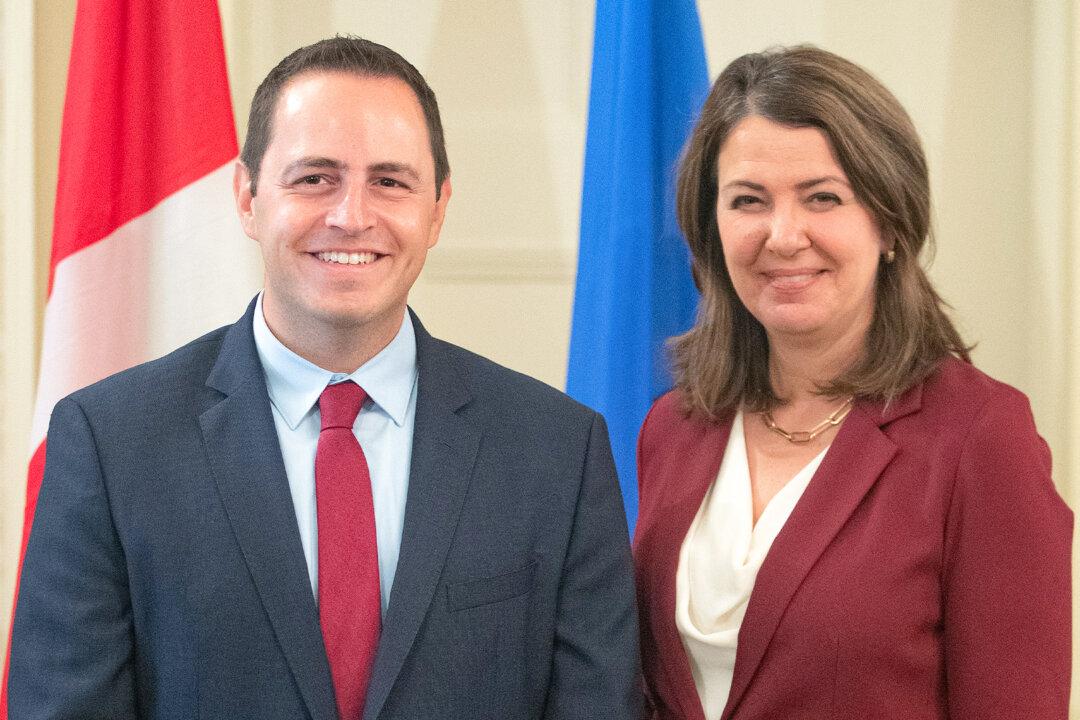- Morning Brief
- Posts
- Alberta Plans to Make Sex Education in Schools Opt-In, Not Default
Alberta Plans to Make Sex Education in Schools Opt-In, Not Default

Alberta Premier Danielle Smith and Minister of Education Demetrios Nicolaides stand together during the swearing in of her cabinet in Edmonton, June 9, 2023. (Jason Franson/The Canadian Press)
Alberta teachers will have to proactively ask parents to enroll their children in sex education lessons under legislation expected from the provincial government this fall.
Currently, parents can opt their children out of sex education classes upon receiving written notice of such instruction. The new legislation would make parents aware of the content taught in sex education classes, and allow them to decide whether it is appropriate and meets the needs of their child.
“We have heard from parents across the province that they want to be more involved and have more say in their child’s education, especially in respect to sexual education,” said Education Minister Demetrios Nicolaides in an emailed statement to The Epoch Times.
“We are confident that the proposed changes will help support student success by strengthening the connection between parents and their child’s education.”
Alberta Premier Danielle Smith first announced the opt-in model for sexual education in schools in January when she introduced policies related to gender-altering procedures and pronoun changes at schools.
She said classroom instruction on gender identity, sexual orientation, and human sexuality would require parents to sign up their children for that section of the curriculum, adding that all outside teaching materials, including third-party presentations, would have to be pre-approved by the Ministry of Education “to ensure the materials are age-appropriate.”
Julie Kusiek, board chair of Edmonton Public Schools, wrote in a February letter to Smith that the current sex-ed curriculum is factual and age-appropriate, and that the opt-in model adds “administrative red tape” without increasing parental control.
Nicolaides said he intends to introduce the legislation this fall, and that he will continue to consult stakeholders—including school boards, teachers, parents, and superintendents—throughout its implementation.
Increased Parent Involvement
Jeff Park, executive director of Alberta Parents’ Union, which advocates for parent involvement in education, said the proposed legislation would allow parents to decide what is best for their children.
“Parents are the real experts of their own kids, and parents know what kids can handle,” he told The Epoch Times. “We think that this opt-in, rather than opt-out, is a step in the right direction.”
Making sex education optional rather than the default may lead parents to consider their choices differently, Park said. Actively enrolling their children in the classes will prompt parents to familiarize themselves and make an informed decision about what their children will be taught.
Park said a common concern among parents is that information related to sexual orientation or gender identity may not be classified as a “sexuality” topic by some schools but as a diversity issue, and therefore not require parental consent.
Other concerns include parents giving consent to sex education early in the school year without knowing how often or what content will be taught in the classroom.
Kellie Pirie, a Calgary detransitioner who lived as a man for several years, told The Epoch Times in an earlier interview she thinks many Canadian schools are sexualizing children with many of the lessons and books presented to them.
Park, a father of four, said it’s important for parents to consider what kind of content is appropriate for their children. “There’s not a one-size-fits-all at this age because certain kids are more mature around these subjects than others,” he said.
He is concerned that some children may fixate or dwell on things they are exposed to in school and said parents are in the best position to know what affects their kids’ mental health.
Jason Schilling, president of the Alberta Teachers’ Association, said sex-ed is taught using materials vetted by Alberta Health Services, and that the proposed law could have students missing out on valuable information at a time when Alberta is experiencing high rates of sexually transmitted infections.
Uncertainty
The Calgary Board of Education (CBE) said in an email to The Epoch Times that it was not consulted about the new policy direction and it has had “conversations on the topic” with the education ministry.
Public school divisions in both Edmonton and Calgary said they are waiting for more information from the province.
The fall legislature sitting is set to begin in late October.